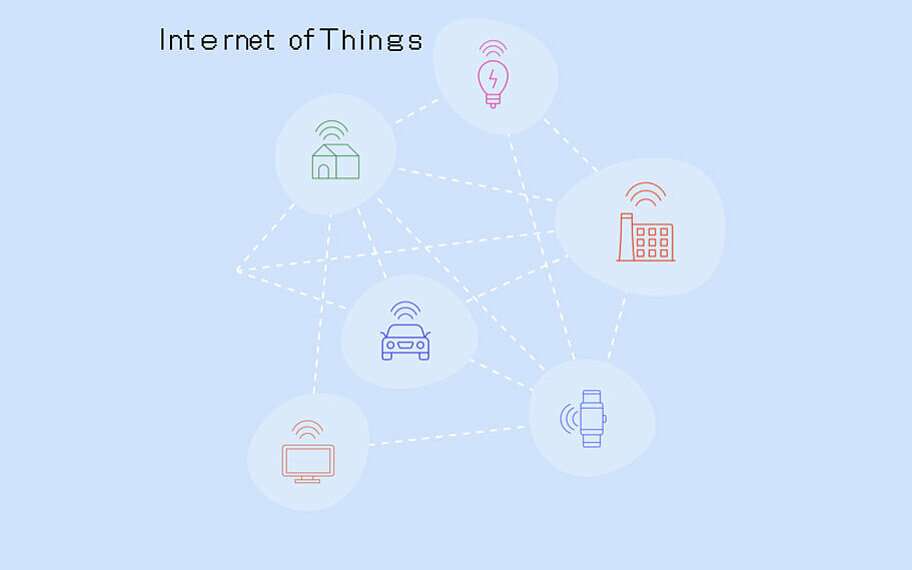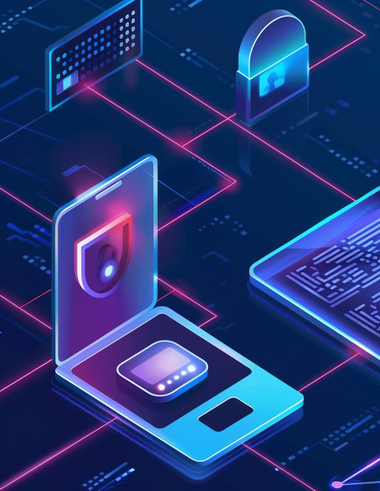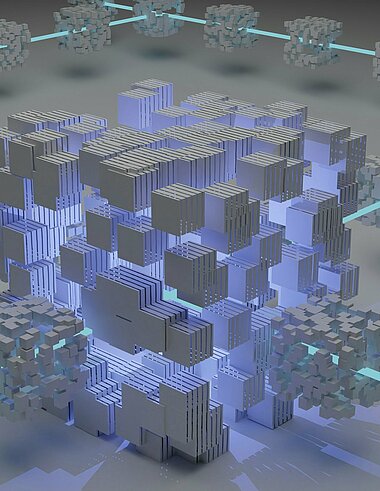In times of increasing digitalisation, networked worlds are playing an ever-greater role. Devices and machines are smartly connected and can communicate with each other via the internet - the Internet of Things (IoT). Blockchain technology is a central building block with a powerful impact. Thanks to this development, more and more industries are benefiting from the synergies that result from their interaction. Berlin is the starting point for significant innovations.
In the processing of data from the IoT, blockchain is a fundamental element for digital transformation.
According to Arne Flick, COO and co-founder of IoT ONE Exchange based in Berlin and Shanghai, IoT and blockchain are complementary key technologies that complement each other in the best possible way. Flick describes the unimaginable amounts of data emerging from the IoT as the "fuel of the new millennium" because it has the potential to "turn business models upside down, rethink them and make money from them in the first place."
The IoT is simply all devices that are connected to the internet and capable of sending and receiving data - from smartphones to industrial robots. The more data the IoT generates, the more difficult it becomes to ensure the security of that data and efficient processes for handling it. This is where blockchain proves to be the missing piece of the puzzle needed to achieve breakthrough technological advances using IoT data.
Technification of trust
Blockchain, or more precisely the associated Distributed Ledger Technology (DLT), offers the possibility of ensuring trust and transparency for any kind of digital data exchange without human involvement. In this context, Arne Flick speaks of an M2M (machine-to-machine) age in which machines, for example, autonomously execute business processes among themselves based on certain rules. In terms of security, the blockchain also plays an essential role in the IoT context: while a few years ago, for example, one had to make do with VPNs, it is now possible via blockchain to encrypt not only data lines, but also the data itself - and to do so fully automatically. This results in a security infrastructure for the IoT that would be inconceivable without blockchain - and which is imperative to ensure the necessary level of data protection for technological innovations.
Another possible application is that of smart contracts. Here, the digital contract is based on a blockchain and the stipulated agreements are written directly in lines of code. The smart contracts then come into force independently after being digitally signed and can automatically send certain predefined commands in encrypted form on the Internet of Things. The advantage: Compared to classic contracts in paper form, a higher level of contractual security is ensured, gaps in documentation are avoided and, at the same time, processes can be completed more quickly.
Since IoT devices and machines generate a large amount of sensitive data, the topics of data protection and privacy play a central role in the processing of this data. In essence, the synergy is that the IoT provides data that can be processed via blockchain in a secure, transparent and trustworthy way. Until now, data has mostly been transferred directly from the machine to a database. This poses numerous risks for data leaks. DLT offers decisive added value through the encryption of data, which makes technological breakthroughs possible in practice.
"Connecting data from the IoT and securing the individual data, for example via free third-generation blockchains, is to be seen as the core of the value creation of this fusion." - Arne Flick
Third-generation blockchains will primarily aim to bring cryptocurrency into the mainstream and will focus on solving the problems of energy consumption, scalability, interoperability and usability.
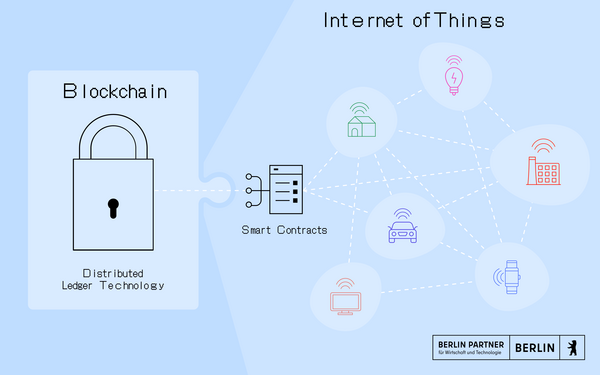
Network for the Berlin IoT scene
The networked world also wants to be networked - this is what the IoT+Network has been doing in Berlin for some time. As part of the Digital Hub Initiative de:hub of the Federal Ministry for Economic Affairs and Energy, it is THE competence centre for the topic of IoT. The network's work includes not only bringing companies, start-ups and investors together, but also promoting and bundling the discussion on the topic of IoT. At regular events, questions about the necessary infrastructure, data security and the interconnection with other technology areas, such as blockchain, are discussed together with experts.
Katarzyna Grajner is responsible for the IoT+Network on behalf of Berlin Partner for Business and Technology:
"One year ago today, the IoT+ Network started its operational work. Seven founding members have now become 25 active partners in the network, who together are rethinking the topic of IoT for and from Berlin. It is a great success for the location to have such a strong IoT business network. Interest in the topic and in the possible applications of IoT, especially in connection with machine learning and blockchain, is growing and leading to innovative solutions and business models. Together with the IoT+ Network, the innovations can be taken up and implemented in projects."
Production back to Germany
Berlin has developed a reputation as a hub for industrially used blockchain and IoT applications, as demonstrated by the establishment of the de:hub on IoT, among other things. This is also evident to the globally significant players from the capital, such as IOTA. Solutions based on IOTA are, for example, zerodefects or KUPKrush, in which a combination of DLT and Digital Twins is used.
The IOTA Foundation has set itself the goal of helping to shape the future digital economy and world in the IoT. With its own communication protocol IOTA, which is based on distributed ledger technology, it aims to create a secure exchange of data and value in the environment of the IoT. The special feature: IOTA waives transaction fees and is thus intended to establish itself primarily as a protocol for micropayments. The result would then be the automated exchange of information between end devices in the Internet of Things.
With its IoT Campus, Bosch has also created one of the largest IoT research fields in Berlin. More than 300 associates work on projects related to the Internet of Things and digital transformation at the campus in Berlin-Tempelhof and advise and support its customers. The IoT Campus is also a physical location where the entire IoT ecosystem comes together.
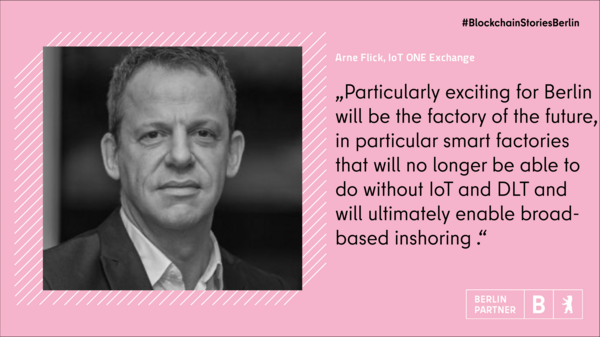
"Particularly exciting for Berlin will be the factory of the future, in particular smart factories that will no longer be able to do without IoT and DLT and will ultimately enable broad-based inshoring - production will mainly be done by autonomously interacting bots and will no longer have to be carried out in cheap labour countries in the Far East," Arne Flick also tells us.
Smart factories in the field of Industry 4.0 will play an increasingly important role. Especially due to the production environment without human intervention, processes can be completed much faster. This not only makes companies more profitable and efficient, but also allows more individual customer wishes to be taken into account. Products and production facilities can communicate and be controlled in the IoT. These technologies are already being used to some extent in the automotive industry.
We can definitely look forward to further exciting networking possibilities with blockchain in the Internet of Things.

